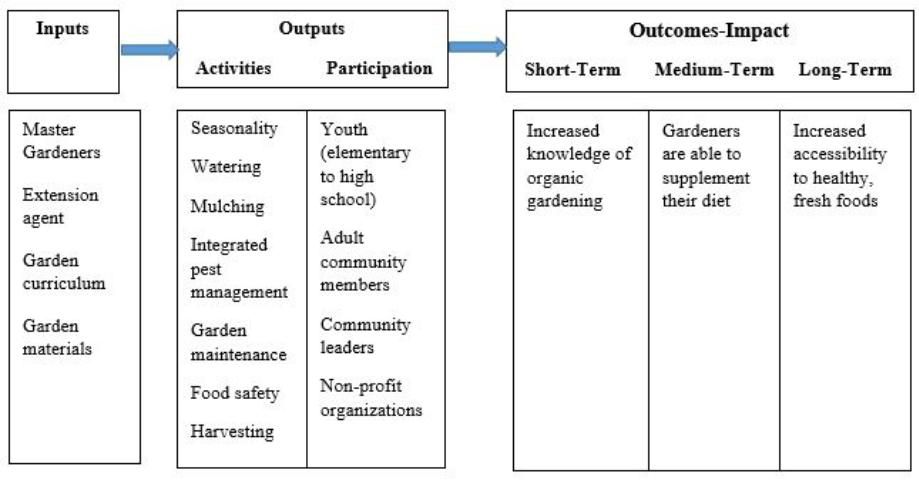Introduction
Extension clientele often contact agents for expertise on starting or maintaining a community garden. Agents assist these clientele in a variety of ways; they provide on-site technical assistance, workshops, and volunteers, and connect with organizations and municipalities. However, agents' ability to collect meaningful, reportable data from these activities can be a challenge. To address this deficit, the authors conducted a statewide Delphi study to identify community garden outcomes through a consensus-style process with 53 stakeholders. This publication outlines the outcomes that were identified through the study as the most important to include in program evaluation.
The Delphi Process
The Delphi technique is an iterative study designed to document consensus among a group of key stakeholders (Warner, 2015). For this study, community garden stakeholders from across Florida completed three surveys between February to May of 2017. The first survey asked participants to list all of the outcomes that result from a successful community garden program, including short-, medium-, and long-term outcomes. The authors defined the outcomes as short-term knowledge, attitudes, skills, and aspirations; medium-term behavior change of adoption of best practices; and long-term social, economic, and environmental conditions. Participant responses were categorized into these outcome definitions and used in the second survey. Participants were asked to rate their agreement with how meaningful each outcome is in the evaluation of a successful community garden program. These responses were then used to further condense the list to items that two-thirds of the participants strongly agreed or agreed were important outcomes for evaluation. This process was repeated for the third survey in which participants achieved consensus on all the items listed except for two items starred in the table below. The authors categorized the final results based on outcome level (short-, medium-, or long-term) into a comprehensive logic model framework.
Findings and Implementation
Participants identified short-, medium-, and long-term outcomes that they felt were most important to evaluate in community garden programs. The results create the infrastructure for a logic model that agents can utilize in program planning. Agents can utilize the results to select outcomes that align with objectives for specific learning activities. For example, if an agent's activities focus on teaching vegetable gardening to community gardeners, the short-term outcome 'knowledge of organic gardening' and the medium-term outcome 'gardeners are able to supplement their diet with the food that they grow' can be reported under objectives that seek to demonstrate knowledge gain and behavior change, respectively (Figure 1).

Agents and program coordinators and assistants can use these results to develop programs that include activities to meet the intended outcomes. Figure 2 shows how they can develop a full logic model through the development and design process that connects with the results of this study.

Future work will include the development of evaluation tools to collect information on these outcomes from program participants.
Summary
While evaluating the success of Extension-related community garden programs can be challenging, it is paramount to stay in tune with the outcomes of such efforts for the sustainability of the gardens themselves. The results of the Delphi study presented in this paper represent consensus among key stakeholders across the state that outlines a shared vision of success for community gardens. These results provide a set of key indicators that can be integrated into a framework for program evaluation that will allow Extension to understand how it's educational and technical assistance promotes garden success. They also provide an opportunity to create synergy across gardens by outlining key outcomes during the development process that will allow for the opportunity for aggregate impacts across the state because gardens are working towards the same end.
References
Warner, L. A. (2015). Using the Delphi technique to achieve consensus: A tool for guiding extension programs. WC183. Gainesville: University of Florida Institute of Food and Agricultural Sciences. https://edis.ifas.ufl.edu/wc183